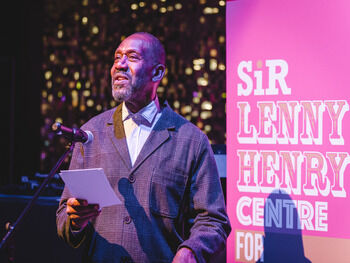University News Last updated 29 May 2024

Sir Lenny Henry has issued a “battle cry” for more representation in television, film and media – and says the fight for diversity is more important than it’s ever been.
Speaking at the launch anniversary of the Sir Lenny Henry Centre for Media Diversity, which he co-founded in 2020, the celebrated comedian, writer, actor and campaigner said the gains made over the past decade were under threat because of cost-cutting.
“Diversity and inclusion are more important now than when we launched four years ago,” he told guests at an event held at Birmingham City University (BCU) to mark the Centre’s fourth birthday.
“The television and media industries are in crisis. Everybody is cutting costs - and that puts diversity and inclusion roles and jobs at risk.
“Last month, Joanna Abeyie, the BBC’s head of creative diversity left her job, citing a lack of improvement. She was the third person to do that job in three years.
“There is a very real fear that many of the gains made over the last 10 years will all be rolled back, so that’s why this centre for media diversity is more important than ever.”
Marcus Ryder, co-founder of the Centre and its former Head of External Consultancies, echoed Sir Lenny’s concerns, highlighting the need for diverse voices in the news as the General Election beckons.
“When it comes to drama, when it comes to news, when it comes to other genres that decide how we vote, what’s discussed, what is in the public discourse, we are just simply not there,” said Ryder, who is now chief executive of the Film and TV Charity as well as chair of the Royal Academy of Dramatic Art.
“If you thought the work of the Sir Lenny Henry Centre for Media Diversity is done, it hasn’t even started. Diversity is under attack, so the Centre is more important than ever.”
BCU Vice-Chancellor Professor David Mba also praised the Centre’s impact.
“Since its launch, the Centre has quickly become a powerful voice within the media,” said Professor Mba. “Indeed, it has become a powerful voice within BCU.
“We are a University which is uniquely focused on providing opportunities to diverse communities. And, as such, it’s absolutely right that we have a research centre that shines a light on where opportunities are being denied.
“In four years, the Centre has made enormous progress – and I am committed to supporting it to achieve even greater impacts in the future. I look forward to seeing the team grow, with new funding committed for a research assistant, and a paid PhD role.”
The BCU-backed Centre has become increasingly influential within the media industry.
It was recently commissioned to review the BBC’s three-year Creative Diversity commitment of £112 million, and also advised Channel 4 on its Black to Front Project, which builds on the broadcaster’s commitment to improve Black representation on screen and more widely in TV.
“We’ve got so much to celebrate,” said Sir Lenny. “In the last four years, the Centre has published 16 original pieces of research, shaping how the media industry reacts on diversity, inclusion and equality.
“We’ve worked with some of the biggest names in the industry, produced articles on tackling the lack of diversity, and, with Cardiff University, published six editions of Representology, the brilliant magazine about representation in the media.
“We’re working with people of different racial backgrounds, social economic classes, genders, disabilities and sex. And it’s all happening in Birmingham.
“I am incredibly proud of everything we have achieved so far.”
Professor Diane Kemp praised the work of the Centre’s advisory board and team of researchers, adding: “You need to have people who you work with who you trust – and we work well together because we know what we’re doing. We have a goal in mind and we’re not mucking around.”
The Centre’s Director added: “It is really important to celebrate the Centre's achievements. But we also want to acknowledge how hard it is for all those people working in the media diversity and inclusion sphere. They're under a lot of pressure to deliver major change.
“At the LHC, we want to keep reporting on whether, when and how those changes are made, but also to support those people being tasked to deliver it.”
Sir Lenny added: “Britain is more ethnically diverse than ever before. In the media, disabled people want better representation. In film and TV, women don’t just want to be the support anymore. If you can’t see it, you can’t be it. We need to include everybody.
“This isn’t just us celebrating our anniversary, it’s a battle cry for the next four years. We demand opportunity, the right to representation, we want our voices to be heard, and we want it now.”